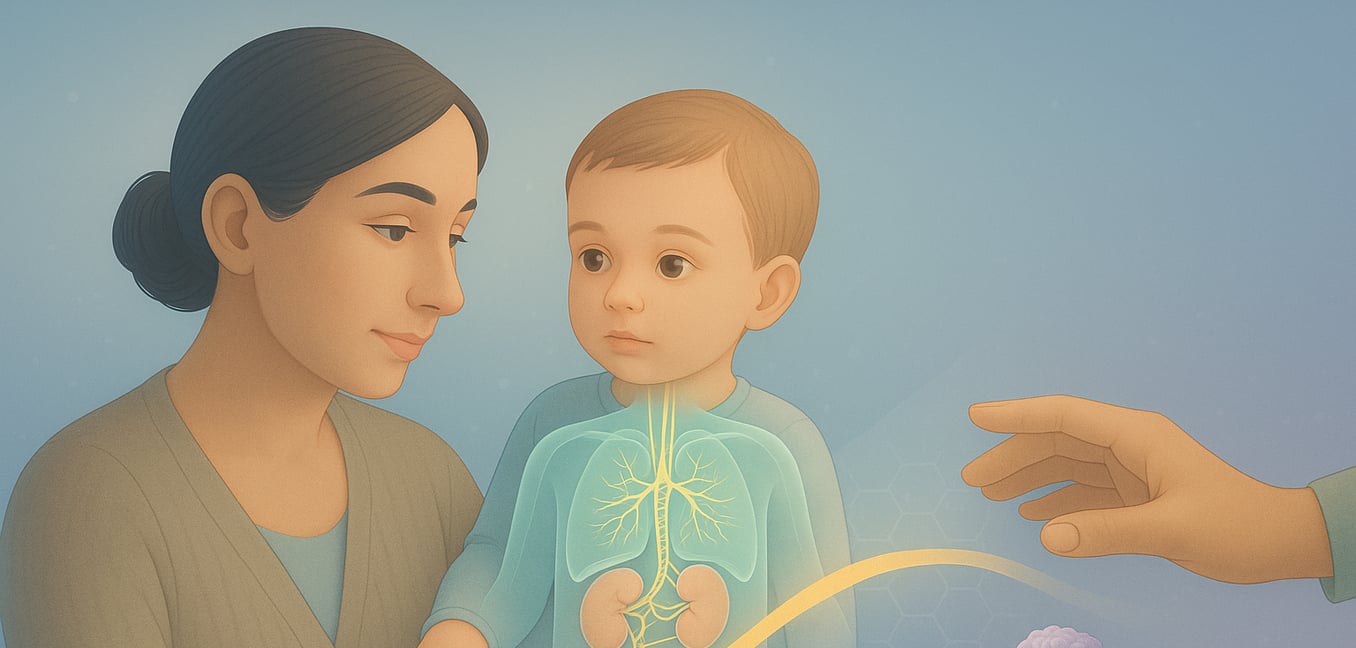Understanding Neuroblastoma: A Brief Guide for Families
Neuroblastoma is a cancer that begins in very early forms of nerve cells, called neuroblasts. It is the most common solid cancer in children found outside of the brain, usually diagnosed in infants and children under five years old. The average age at diagnosis is just 17 months.
These tumors can develop anywhere that clusters of developing nerve cells are found, such as the neck, chest, or pelvis. However, they most often start in the adrenal glands, which are small glands located on top of the kidneys.
Because neuroblastoma arises from cells that failed to mature properly, treatment is not one-size-fits-all. A child's care plan depends on their age and a "risk group" (low, intermediate, or high) determined by the tumor's specific features. Treatment can range from careful observation to a combination of surgery, chemotherapy, and other therapies. A unique feature of some neuroblastomas, especially in infants, is their ability to disappear on their own, a process called spontaneous regression. This possibility is a key factor in deciding the right approach for your child.
Supportive Care: A Partner in Your Child's Journey
When your child is diagnosed with neuroblastoma, the focus is naturally on treating the cancer. However, an equally important part of the care plan is "supportive care." This is not a single treatment but an integrated approach designed to manage symptoms, reduce side effects, and support your child’s and your family's overall well-being.
Supportive care works hand-in-hand with every treatment path, whether that path is active therapy or careful observation. Its goal is to maintain your child's strength, comfort, and quality of life, ensuring they can tolerate treatment as well as possible and continue to grow and thrive.
Support During Observation ("Watch and Wait")
For infants with low-risk neuroblastoma, the best initial plan may be careful observation. This can feel unsettling, but it is an active strategy based on the high likelihood that the tumor will resolve on its own through spontaneous regression.
Opting for observation means your child’s oncology team will monitor the situation closely, not pause care. This involves a structured schedule of follow-up appointments with non-invasive tests, such as ultrasounds to measure the tumor and urine tests to check for tumor markers. This vigilant monitoring ensures that if the tumor grows or causes problems, the team can act immediately.
This approach prioritizes your child's quality of life by avoiding the side effects of treatment when it is not needed. It comes with a clear safety net; your team will have specific criteria for when to switch to active treatment, ensuring this is a safe, controlled phase of care.
Managing Symptoms in Specific Cases: Stage MS
Stage MS neuroblastoma is a unique situation seen in infants under 18 months. The cancer has spread to the skin, liver, or bone marrow, but the tumor biology is still considered favorable. Here, supportive care is the primary focus, aiming to manage symptoms while giving the cancer a chance to regress.
A key concern is an enlarged liver, which can press on the lungs and stomach, causing breathing or feeding difficulties. The care team will monitor your baby’s breathing, suggest positioning to ease pressure, and provide nutritional guidance. In rare cases where symptoms are severe, a very low dose of chemotherapy may be used as a supportive measure to shrink the liver and improve comfort.
The team will also monitor the characteristic bluish skin nodules, which typically fade as the cancer resolves. Regular blood tests check for anemia or low platelets, and transfusions can be given if needed to prevent fatigue or bruising. This approach supports the body’s needs without using aggressive cancer-killing drugs.
Support During Active Treatment
When neuroblastoma requires treatments like chemotherapy or radiation, supportive care is essential to help your child manage the process. It is a proactive partnership between your family and the care team to maintain comfort and strength.
Managing Physical Side Effects
Open communication with your care team is the key to managing side effects. The team can proactively treat issues before they become severe. Common areas of support include:
- Nausea and Vomiting: Anti-sickness medications are often given before chemotherapy to prevent discomfort.
- Pain Control: A personalized plan will be developed to manage any pain effectively.
- Fatigue: The team will help you balance rest and gentle activity to maintain your child's energy.
- Mouth Sores: Special mouthwashes and pain relief can help soothe discomfort and prevent infection.
Nutritional Support
Good nutrition is critical for helping your child tolerate treatment and recover. Side effects can make eating a challenge, so a pediatric dietitian is a vital member of the team. They can help you find creative ways to ensure your child gets the calories and protein needed to stay strong. This may include:
- Recommending nutrient-dense foods and high-calorie shakes.
- Suggesting smaller, more frequent meals.
- Providing nutrition through a temporary feeding tube if eating by mouth is not possible.
Emotional and Psychosocial Support for the Entire Family
A cancer diagnosis affects everyone in the family. Addressing the emotional and psychological impact of treatment is just as important as managing the physical side effects. Hospitals have dedicated professionals to support your child, parents, and siblings.
Child life specialists use play and age-appropriate language to help your child understand procedures and cope with fear. They are experts in reducing anxiety around tests, hospital stays, and treatments.
Social workers and psychologists are also available to provide counseling and connect you with practical resources, such as financial aid or support groups. They offer a safe space to discuss the stress and emotions that come with a cancer diagnosis, helping the entire family build resilience during a difficult time.










